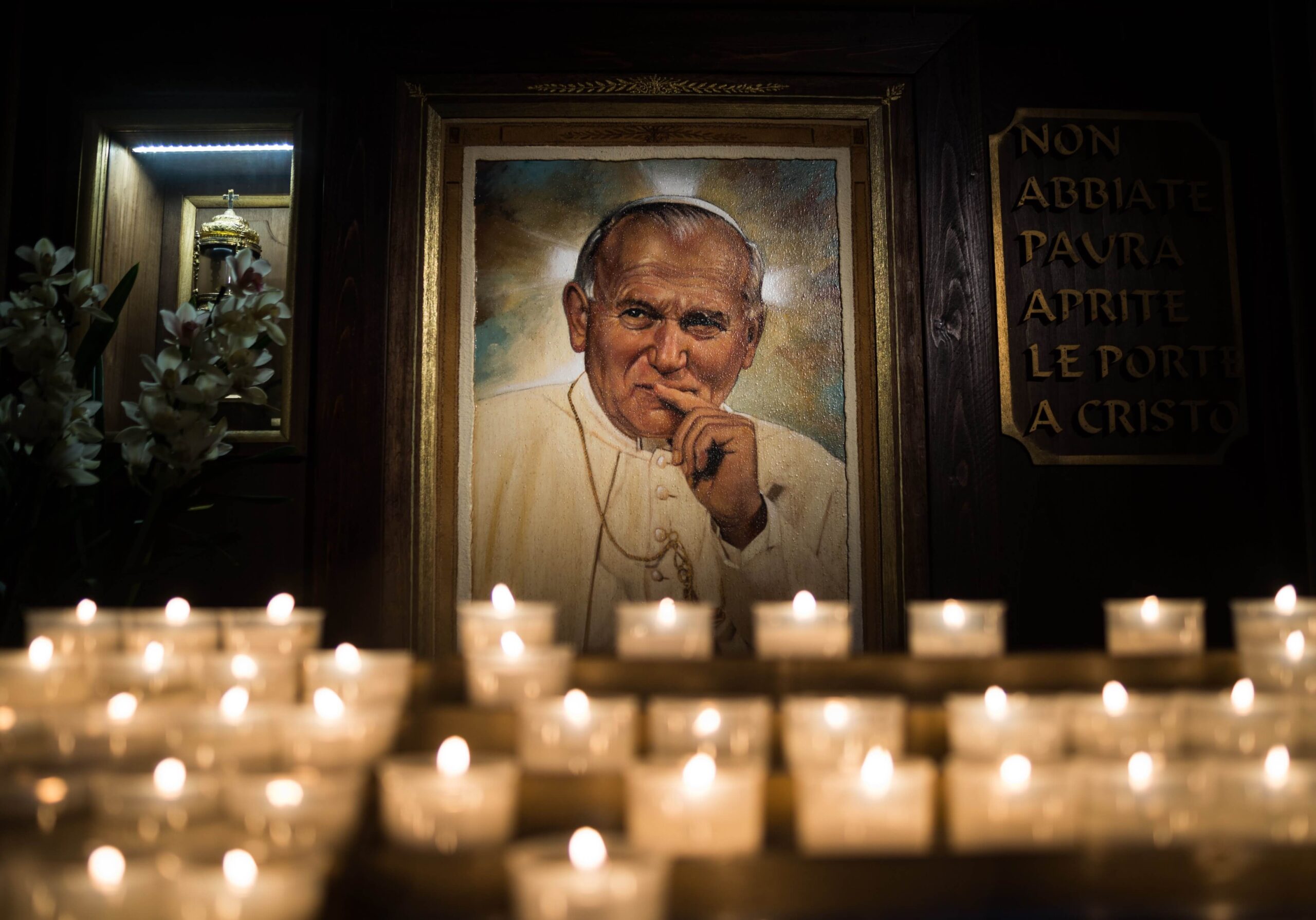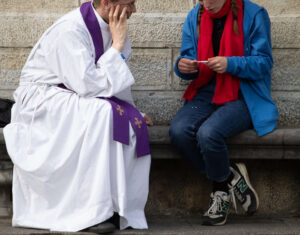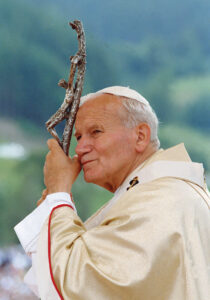
JPII’s Happiest Day
October 13, 2025
Can you identify the happiest day of your life?

Pope St. John Paul II did. It was the day he canonized St. Faustina Kowalska and then declared the second Sunday of Easter as Divine Mercy Sunday. He must have been waiting for this day for a long time, so that day could be pronounced within a context of mercy: the great Millennium Holy Year of 2000. He would breathe his last on the very same Feast Day of mercy that he had decreed with such joy, just 5 years later.
JPII was someone who had a plethora of places to go, people to see, and things to do during the third-longest papacy in the history of the Church. In fact, the effects of his papacy were so profound that the feast day of this saint is not the typical “birthday into heaven” a.k.a. the day he died, but rather the day he began his papacy with a solemn High Mass in St. Peter’s Square, October 22, 1978.
If Pope St. John Paul the Great left such a tremendous mark on the Church through his numerous writings and actions, then we should sit up and pay attention when he appears to have identified the culmination of his papacy. We’re currently in another Jubilee Year during this month of Pope St. John Paul II’s Feast Day. Given that Holy Years have an essential link with mercy, we therefore have strong motivations for exploring this extraordinary saint’s perspective on the theme.
No need to dig very deeply to discover his roots regarding mercy.
Zooming back early in his pontificate, we can catch him during his first public visit outside of Rome following the assassination attempt that almost took his life. He’s on pilgrimage to the Shrine of Merciful Love in Italy.
“Right from the beginning of my ministry in St. Peter’s See in Rome, I considered this message my special task. Providence has assigned it to me in the present situation of man, the Church and the world. It could be said that precisely this situation assigned that message to me as my task before God.” (November 22, 1981, The Feast of Christ the King).

From the start, he considered himself to have been assigned the “special task” of transmitting God’s mercy to the Church and beyond. No wonder he identified his great happiness 22 long years later, when he finally gave the Church a new Feast Day. Even so, his devotion to Divine Mercy goes back many more years prior. He imported this love from his homeland. As pope, he mentioned that during the Nazi occupation of Poland, he would pass by the Divine Mercy Shrine (the resting place of the remains of St. Faustina Kowalska) on his way to work at the Solvay Quarry to make a living and to escape deportation.
It was St. Faustina in the 1930s who heard these words from Jesus:
“I desire that the Feast of Mercy be a refuge and a shelter for all souls, and especially for poor sinners….The soul that will go to Confession and receive Holy Communion shall obtain complete forgiveness of sins and punishment….My mercy is so great that no mind, be it of man or of angel, will be able to fathom it throughout eternity.”
Not only was Pope John Paul II well acquainted with these words, but he captured the timeliness of Christ’s message for the people of today. Already, his preachings on the “feast-day to be” spelled out the connection:
“Who can say he is free from sin and does not need God’s mercy?
As people of this restless time of ours, wavering between the emptiness of self-exaltation and the humiliation of despair, we have a greater need than ever for a regenerating experience of mercy. We should learn to say repeatedly to God with the faith and simplicity of children: “Great is our sin, but even greater is your love!” (April 10, 1994 Second Sunday of Easter Regina Caeli Address).
Wouldn’t you say that these words still apply to us today? On the one hand, we tend to grasp for full control over our lives, and on the other, we feel threatened by an abyss of despair! In fact, we are never alone. Our Lord desires for us to entrust ourselves into his loving hands and let Him lead us to safe pastures. Jesus specifically told St. Faustina to include the invocation: “Jesus I trust in you” on the Divine Mercy image.
Because Pope St. John Paul II thought God’s mercy was essential, he made it the theme of his second encyclical Rich in Mercy (Dives in Misericordia), which he published just two years after becoming pope.

In a recent rereading, three things struck me about his encyclical. The first was the long footnote number 52 that expounds upon the different words for mercy, particularly hesed a kind of masculine mercy and rahamim a kind of feminine mercy. The term hesed is linked to a legal sense of fidelity between two parties who have made a covenant between them. Since the Israelite people so often broke the covenant, God “was relieved” of any legal responsibility to them. But it’s precisely in that context that God shows his true colors. He stays true to Himself by continuously showing them mercy.
“It is not for your sake, O house of Israel, that I am about to act, but for the sake of my holy name” (Ez. 36:22).
Pope St. John Paul II explains:
“The fruits of this love are forgiveness and restoration to grace, the reestablishment of the interior covenant.”
On the other hand, the word rahamim comes from the root word rehem, which means mother’s womb. Thus, the feminine, visceral kind of mercy. God loves us with “all his guts.”
“Rahamim generates a whole range of feelings, including goodness and tenderness, patience and understanding, that is, readiness to forgive.
The Old Testament attributes to the Lord precisely these characteristics when it uses the term rahamim in speaking of Him. We read in Isaiah: “Can a woman forget her suckling child, that she should have no compassion on the son of her womb? Even these may forget, yet I will not forget you” (Is. 49:15). This love (is) faithful and invincible thanks to the mysterious power of motherhood …”

These concepts of mercy should feed our hope in receiving it from Him, as often as we humbly turn to ask for it. The misery caused by our sins, no matter how murky, has no power over the gracious and enduring love of God our Father. What a comfort this is.
The second point that stood out in Pope St. John Paul II’s encyclical was this assertion:
“An act of merciful love is only really such when we are deeply convinced at the moment that we perform it that we are at the same time receiving mercy from the people who are accepting it from us. If this bilateral and reciprocal quality is absent, our actions are not yet true acts of mercy, nor has there yet been fully completed in us that conversion to which Christ has shown us the way by His words and example, even to the cross, nor are we yet sharing fully in the magnificent source of merciful love that has been revealed to us by Him.” (N.14)
I feel called by these words to reflect and pray deeply about my own attitudes when I attempt to be merciful to others. Do I realize I’m just a fellow beggar, a “useless servant” like the one referred to by Jesus in Luke 17:10?
Years ago, I remember listening to Aturo Mari, JPII’s photographer, who treated the pope like a son. Though it was more than 25 years ago I can still recall Aturo’s vivid description of an unusual occurrence on one of the many days that the Pope celebrated mass in a Roman parish. A young boy of around 5 years old, who lived within walking distance of the Church, was so excited that he couldn’t wait for his parents to leave for church. He ran there on his own. Being so small, he easily skirted the guards to plant himself in the pathway of the pontiff. There, he dug his hands into his pocket and pulled out a caramel candy to lovingly offer to the pope. Aturo described the humility and tenderness with which the pope received this tiny gift from the little boy. Visibly moved by the warm gesture of welcome, he sincerely responded: “I don’t deserve this.”
The pope’s humble attitude here speaks even more loudly than his words. Lesson for me: if I think for an instant that I am somehow superior to those I serve, then I am simply and sadly mistaken.
The other idea from Pope St. John Paul II’s encyclical on mercy that recently caught my attention comes near the beginning:
“The present-day mentality, more perhaps than that of people in the past, seems opposed to a God of mercy, and in fact tends to exclude from life and to remove from the human heart the very idea of mercy.” (N. 2)

In the context of those words, Pope St. John Paul II speaks about how our development of science and technology doesn’t leave much room for mercy. Clearly, if we think we can solve the world’s problems on our own, we won’t feel the need to turn to our Creator and Redeemer for His help and forgiveness, two key elements of mercy.
Words I already cited above shed some more light on our current “allergy” to mercy: “As people of this restless time of ours, wavering between the emptiness of self-exaltation and the humiliation of despair…” A proud self-assertion is very different from a healthy self-autonomy that leaves room for mutual self-giving. God created us as social beings, so we can only flourish in a setting where we can express our relationality, where we can love and receive love. He did not design us to be alone.
Another reason why we seem to be especially closed to mercy today is our difficulty in trusting. Trust breeds hope just as mistrust sows despair. Children are being taught through the media to mistrust all authority including their parents and, even worse, to doubt their very own bodies. At a young age, they’re being given a “guidance” that they find to be confusing and disturbing: to figure out what gender they are. They’re being taught to doubt their deliberately God-given sexual identity. What a terrible solitude individuals must experience when they cannot even trust their own sexual identity as given by their bodies, because then they’re not even at home in their own selves. Where could a person find rest and security if they cannot be at home with his/her very self?
A famous young “transgender-identified” person who had his own reality show went through four “sex change surgeries”. Afterwards, he was filmed on his show weeping as he lamented to his mother: “I just want to feel like myself. All I want is to be happy and feel like me, and I don’t feel like me ever.”
My body is me, so if I reject it, I am rejecting my own self.
To teeter alone at the brink of the chasm of despair, or to surrender ourselves trustfully to Someone who declares grandiosely that no one will ever be able to fathom the extent of his mercy for all of eternity? Seems evident which way to go, but nevertheless, each one of us needs to choose. For my part, I prefer to declare “Jesus, I trust in you”!

Written by,
Dr. Joan Kingsland*,
Fellow & Theological Consultant
for Ruah Woods Institute
*Joan Kingsland SThD, has been a member of the Society of Apostolic Life, the Consecrated Women of Regnum Christi since 1993. She earned licentiate and doctoral degrees in moral theology at the John Paul II Institute for Marriage and the Family in Rome, as well as a Bachelor of Arts degree from Thomas Aquinas College, and a Master of Arts degree from the Pontifical Institute of Medieval Studies at the University of Toronto. She taught moral theology and Catechetics at Mount St. Mary’s Seminary in Cincinnati from 2016-2018, moral theology at Mater Ecclesiae College in Rhode Island from 2006-2015, and Catholic Faith Formation, grades 5-10 at the Highlands School in Dallas, Texas from 2002-2006. During the academic year she resides in Rome and teaches the Social Doctrine of the Catholic Church at Regina Apostolorum Seminary, and in the summer returns to Cincinnati to work in person at Ruah Woods Institute to help in developing curriculum, training, and formation for educators K-12 to become witnesses and passionately understand and teach Theology of the Body to their students.
Share